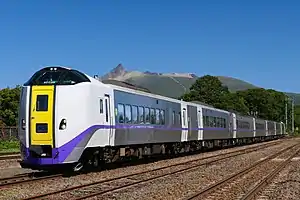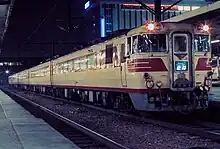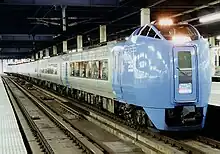 KiHa 261 series DMU on Hokuto service | |
| Overview | |
|---|---|
| Service type | Limited express |
| Status | Operational |
| First service | 1949 (Express) 1965 (Limited express) 1994 (Super Hokuto) |
| Last service | 2020 (Super Hokuto) |
| Current operator(s) | |
| Route | |
| Termini | Hakodate Sapporo |
| Stops | 15 |
| Distance travelled | 318.7 km (198.0 mi) |
| Average journey time | 3 hours 40 minutes approx |
| Service frequency | 12 return workings daily |
| Line(s) used | Hakodate Main Line (Hakodate-Oshamambe)
Muroran Main Line (Oshamambe-Tomakomai) Chitose Line (Tomakomai-Sapporo) |
| On-board services | |
| Class(es) | Standard + Green |
| Disabled access | Yes |
| Sleeping arrangements | None |
| Catering facilities | None |
| Observation facilities | None |
| Entertainment facilities | None |
| Other facilities | Toilets |
| Technical | |
| Rolling stock | KiHa 261 series |
| Operating speed | 130 km/h (81 mph) |
| Track owner(s) | JR Hokkaido |
The Hokuto (北斗) is a limited express train service that runs between Sapporo and Hakodate in Hokkaido, operated by Hokkaido Railway Company (JR Hokkaido). The journey time of the Hokuto is approximately 3 hours 40 minutes.
Super Hokuto services started on 1 March 1994,[1] and cut journey time by about 30 minutes due to the higher speeds through the many curves of the line between Sapporo and Hakodate. All trains have been renamed to Hokuto since 2020, after the KiHa 183 series used on the original Hokuto service was replaced with KiHa 261 series.
Stops
Trains stop at the following stations:
| Station | Connections | Location | |
|---|---|---|---|
| H75 | Hakodate | Hakodate Main Line Hakodate Liner Line |
|
| H74 | Goryōkaku | Hakodate Main Line Hakodate Liner Line |
|
| H70 | Shin-Hakodate-Hokuto | Hakodate Liner Line |
|
| H67 | Ōnuma-Kōen | ||
| H62 | Mori | ||
| H54 | Yakumo | ||
| H47 | Oshamanbe | ||
| H41 | Tōya | ||
| H38 | Date-Mombetsu | ||
| H32 | Higashi-Muroran | ||
| H28 | Noboribetsu | ||
| H23 | Shiraoi | ||
| H18 | Tomakomai | ||
| H14 | Minami-Chitose | ||
| H05 | Shin-Sapporo | ||
| 01 | Sapporo | ||
Rolling stock
The Hokuto is operated by 7-car KiHa 261 series DMUs,[2] with car 1 at the Hakodate (southern) end. All cars are no-smoking. Until 30 September 2022, the Hokuto was also operated by KiHa 281 series DMUs.[3]
For departures using KiHa 281 series, cars 1, 2 and 4 to 7 were ordinary-class cars with 2+2 seating, and car 3 was a "Green" car with 2+1 seating.
| Car No. | 1 | 2 | 3 | 4 | 5 | 6 | 7 |
|---|---|---|---|---|---|---|---|
| Accommodation | Reserved | Reserved | Green | Reserved | Reserved | Non-reserved | Non-reserved |
| Facilities | Toilets | Toilets | Wheelchair space, accessible toilet | Toilets |
For departures using KiHa 261 series, car 1 is a "Green" car with 2+1 seating, and cars 2 to 7 are ordinary-class cars with 2+2 seating.
| Car No. | 1 | 2 | 3 | 4 | 5 | 6 | 7 |
|---|---|---|---|---|---|---|---|
| Accommodation | Green | Reserved | Reserved | Reserved | Reserved | Non-reserved | Non-reserved |
| Facilities | Wheelchair space, accessible toilet | Toilets | Toilets | Toilets | Toilets |
 A KiHa 80 series DMU on a Hokuto service circa 1986
A KiHa 80 series DMU on a Hokuto service circa 1986 A KiHa 183 series DMU on a Hokuto service in 1992
A KiHa 183 series DMU on a Hokuto service in 1992 A KiHa 183 series DMU on a Hokuto service in February 2010
A KiHa 183 series DMU on a Hokuto service in February 2010 A KiHa 281 series DMU on a Super Hokuto service in 1994
A KiHa 281 series DMU on a Super Hokuto service in 1994 A KiHa 283 series DMU on a Super Hokuto service in June 2001
A KiHa 283 series DMU on a Super Hokuto service in June 2001 A KiHa 261-1000 series DMU on a Super Hokuto service in May 2016
A KiHa 261-1000 series DMU on a Super Hokuto service in May 2016
References
- ↑ Haraguchi, Takayuki (2009). Encyclopedia of JR's Railway Cars: JR全車輌. Japan: Sekai Bunka. p. 115. ISBN 978-4-418-09905-4.
- ↑ "JR北海道、2022年度までに特急北斗をすべてキハ261系に_H100形気動車も追加投入" [JR Hokkaido all special express Hokuto Kiha 261 series by 2022 - H100 series additional railcar also introduced]. tetsudo-ch.com (in Japanese). EXPRESS Co., Ltd. 22 April 2019. Archived from the original on 14 July 2019. Retrieved 14 July 2019.
- ↑ "定期列車での営業運転を終えたキハ281系が返却回送される" [Final KiHa 281 series trainset in regular service transported to depot]. Japan Railfan Magazine Online (in Japanese). Japan: Koyusha Co., Ltd. 1 October 2022. Retrieved 14 October 2022.
External links
- JR Hokkaido KiHa 281/283 Super Hokuto train information (in Japanese)